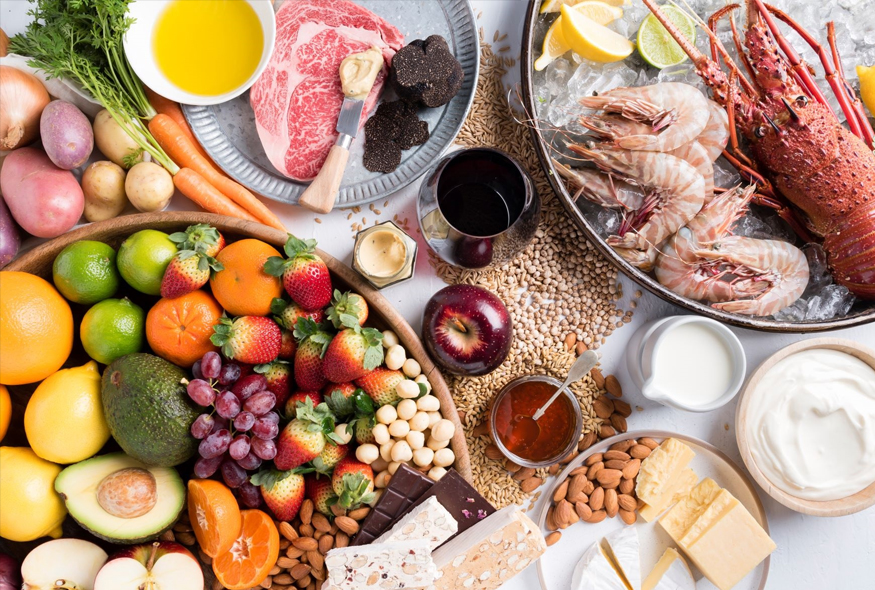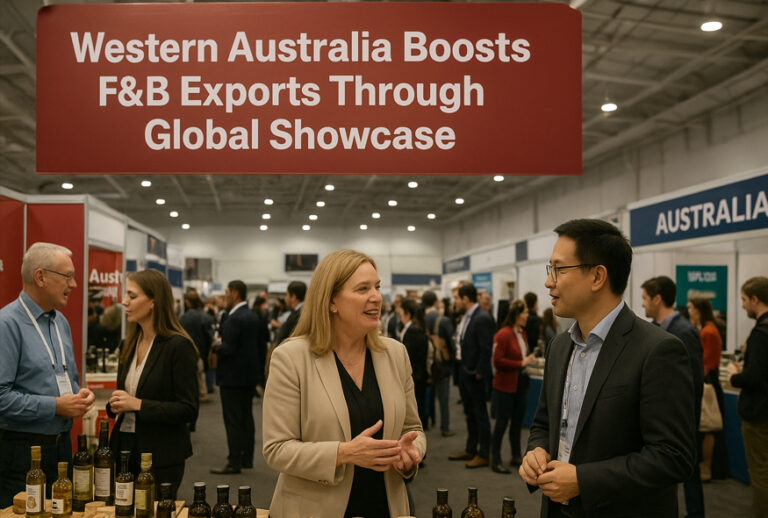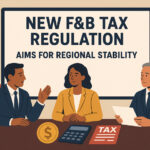Premium Biz Post – Western Australia Boosts F&B Exports Through Global Showcase — this event highlights the state’s commitment to promoting its rich and diverse food and beverage industry on the international stage. Local producers, exporters, and investors gathered to explore new business opportunities and strengthen Australia’s reputation as a trusted global supplier of premium-quality food products.

A Platform for Global Connection
Held in Perth, the event “Meet the Buyer” served as a central hub where international buyers met directly with Western Australian food and beverage companies. Organized by the Department of Primary Industries and Regional Development (DPIRD), the showcase aimed to increase the visibility of WA’s unique agricultural products and help small and medium enterprises (SMEs) expand into export markets.
More than 100 local producers participated, ranging from seafood and dairy to craft beverages and specialty condiments. The showcase was not only about selling products but also about building long-term relationships with buyers from Asia, the Middle East, and Europe. Delegates from countries like Japan, Singapore, and the United Arab Emirates attended the event, underlining the growing global interest in sustainable, high-quality Australian products.
A Growing Appetite for Western Australian Produce
Western Australia’s food and beverage sector has long been known for its emphasis on clean, green, and safe products. The region’s pristine environment, advanced agricultural technologies, and commitment to sustainable practices make it an attractive partner for global importers.
Recent data from the Western Australian Food Industry Innovation team shows that the state’s agri-food exports have grown by over 12% in the past year. This surge is fueled by increasing demand for premium seafood, wine, and plant-based products. WA producers are also focusing more on organic certification and traceability — two aspects highly valued in international markets.
According to industry leaders, Western Australia’s strategy is not just to export raw goods but to expand value-added manufacturing. For example, local companies are developing premium snacks, artisan cheeses, and ready-to-eat meals that cater to global tastes while maintaining their Australian identity.
Government Support and Industry Collaboration
The Western Australian Government continues to play a crucial role in supporting exporters through initiatives like Food Industry Innovation and Buy West Eat Best. These programs help local businesses meet international standards, enhance packaging, and understand market trends.
Agriculture and Food Minister Jackie Jarvis emphasized that collaboration between government, industry, and research institutions is essential to maintain Western Australia’s competitive edge. “Our producers have world-class quality and sustainability practices. The ‘Meet the Buyer’ showcase ensures they connect with buyers who value those qualities,” she stated during her speech at the event.
In addition to funding trade missions, the government is investing in digital export tools that allow small businesses to navigate international logistics, tariffs, and certification processes more easily. This digital transformation aligns with Western Australia’s broader economic diversification plan.
Read More : ”Aesthetic Seashell Hanging Decor Bringing a Touch of Nature into Your Space”
Sustainability at the Core
Sustainability remains one of the most important themes in the Western Australian food and beverage industry. Many showcased companies highlighted their efforts to reduce waste, improve water efficiency, and transition toward renewable energy in production facilities.
For example, local seafood exporters are now adopting eco-label certifications to assure international partners that their sourcing is ethical and environmentally responsible. Wineries in Margaret River are integrating solar technology, while dairy producers are investing in methane reduction programs. These sustainability initiatives not only appeal to environmentally conscious consumers but also improve the long-term resilience of the industry.
Innovation Driving Growth
The showcase also highlighted innovation as a key growth driver. Western Australian companies are embracing advanced food technologies such as cold-chain logistics, blockchain traceability, and AI-driven demand forecasting. These innovations ensure that products remain fresh, compliant, and competitive in international markets.
Startups in the beverage sector demonstrated creative use of native Australian ingredients like lemon myrtle, wattleseed, and finger lime — transforming traditional flavors into premium craft drinks. Meanwhile, food-tech firms are developing alternative proteins and functional foods that respond to changing consumer preferences worldwide.
According to DPIRD, innovation will continue to play a vital role in positioning Western Australia as a global leader in food and beverage exports. The government’s upcoming Agri-Innovation Strategy 2030 aims to foster more collaboration between researchers and producers to create export-ready solutions.
Challenges and Future Opportunities
Despite strong momentum, Western Australian exporters still face several challenges. Rising global freight costs, fluctuating exchange rates, and complex export regulations remain key concerns for SMEs entering new markets. The showcase served as an important forum to address these issues, with experts offering workshops on trade compliance, logistics optimization, and cross-border marketing.
Participants also discussed the importance of diversification. While Asia remains a major destination for Western Australian exports, emerging markets in the Middle East and Europe are becoming increasingly attractive due to shifting consumer demands. Many buyers are seeking authentic, traceable, and sustainably produced food — all areas where WA excels.
To further support exporters, trade organizations are recommending stronger branding and storytelling to differentiate Western Australian products from competitors. Highlighting the provenance, sustainability, and craftsmanship behind each product can help capture the attention of global consumers who are willing to pay a premium for authenticity.
The Role of Collaboration and Community
The “Meet the Buyer” event was not only a marketplace but also a community-building effort. Local producers had the chance to network with other exporters, share best practices, and explore joint ventures. Collaborative projects are already forming — such as shared distribution channels and co-branding initiatives to reduce costs and increase visibility abroad.
Regional communities in Western Australia are also expected to benefit from the export boost. As demand grows, it creates more jobs in farming, processing, and logistics, thereby strengthening local economies. Educational institutions and training centers are now working to equip the next generation with skills in food technology, sustainability, and export management.
Western Australia’s Global Vision
Western Australia’s global vision for the food and beverage sector goes beyond trade. It seeks to promote a culture of innovation, sustainability, and international cooperation. The “Meet the Buyer” showcase exemplifies how government, industry, and communities can come together to project Western Australia’s identity as a world-class food producer.
As global consumers continue to prioritize transparency and ethical sourcing, Western Australia stands out for its integrity and product excellence. From premium wines to innovative plant-based foods, the region is steadily building its reputation as a trusted partner in global trade.
The message from this year’s event is clear: Western Australia is open for business — and ready to feed the world with quality, sustainability, and innovation.
The success of the “Meet the Buyer” showcase underscores Western Australia’s growing role in global food and beverage exports. With strong government support, sustainable practices, and a forward-thinking industry, the region is well-positioned to expand its reach across continents.
As Western Australian companies continue to innovate and adapt to global market demands, the state’s F&B export industry is set to thrive. The world’s appetite for premium Australian products is growing — and Western Australia is ready to deliver.



